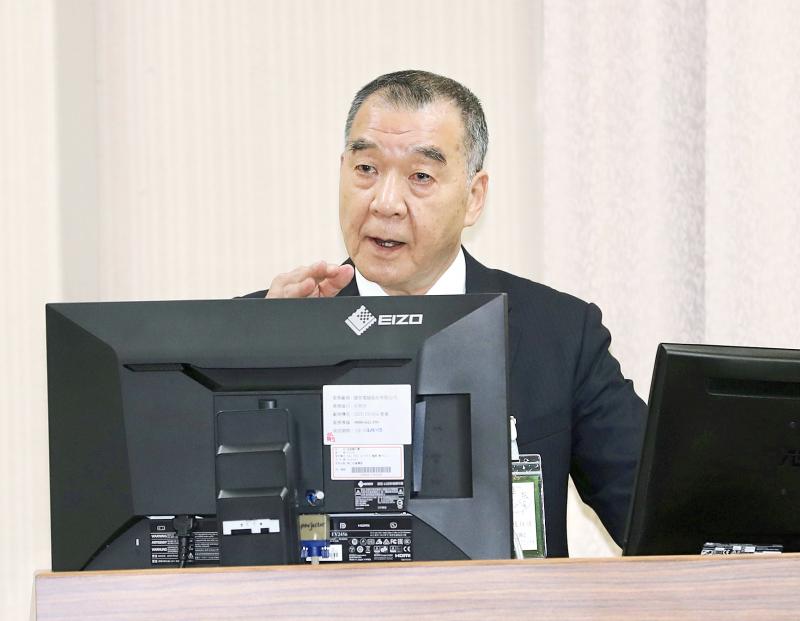The National Security Bureau’s (NSB) work has become more important as cross-strait information warfare has intensified, bureau Director-General Chiu Kuo-cheng (邱國正) told lawmakers on the Foreign Affairs and National Defense Committee yesterday as he refuted claims by a US academic that the bureau has been infiltrated by China.
Democratic Progressive Party Legislator (DPP) Lo Chih-cheng (羅致政) asked Chiu about the People’s Daily’s “Letter to Taiwan’s Intelligence Agencies,” which called on Taiwanese intelligence agents to “cooperate with the motherland” and not be “hijacked” by pro-independence factions.
The letter in the Chinese Communist Party’s newspaper followed China Central Television (CCTV) reports earlier this month about “several hundred cases” of Taiwan’s espionage activities uncovered through Beijing’s “Thunder 2020” operation.

Photo: CNA
Chiu told lawmakers that the bureau would not respond publicly to the letter, which was the usual Chinese mix of civil and military intimidation tactics.
Asked about former US diplomat and China expert Charles Freeman’s statement that the bureau had been infiltrated from top to bottom by China, Chiu said the claim was completely false.
“No matter who it is, they must not underestimate the NSB,” he said.
The bureau has instructed its staff about appropriate conduct, and Taiwan does not need to dance to China’s tune on matters that do not concern it, Chiu later told reporters.
Asked by Chinese Nationalist Party (KMT) Legislator William Tseng (曾銘宗) about the possibility of cross-strait war in the near future, Chiu said that it was higher than normal and the bureau was considering all scenarios.
Pressed by Tseng about China applying economic or trade pressure rather than military force against Taiwan, Chiu said that it was a possibility, as China would use any means to harm Taiwan.
He would not make a prediction, he said.
As for former Mainland Affairs Council deputy minister Chao Chien-min’s (趙建民) claim that the Taiwan Strait is already in a state of quasi-war, Chiu said that tensions are obvious and the nation’s military and intelligence communities are paying close attention.
However, the public should not worry, as any Chinese movements would be closely followed by the bureau, he said.
When China’s Taiwan Affairs Office spokeswoman Zhu Fenglian (朱鳳蓮) was asked the same question on Wednesday in Beijing, she wordlessly flipped through her notes for 30 seconds before asking reporters to move on to the next question.
The incident shows that CCP spokespeople “are all robots without brains of their own,” DPP Legislator Wang Ting-yu (王定宇) wrote on Facebook on Wednesday.
“Without authorization or information from their superiors, they do not know how to speak,” he said.
“This ‘glitch’ has shown the world that CCP leadership has not entered ‘state of quasi-war’ into its Q&A database, let alone ‘state of war,’” he added.
Additional reporting by Aaron Tu

GENSLER SURVEY: ‘Economic infrastructure is not enough. A city needs to inspire pride, offer moments of joy and foster a sense of belonging,’ the company said Taipei was named the city with the “highest staying power” in the world by US-based design and architecture firm Gensler. The Taiwanese capital earned the top spot among 65 cities across six continents with 64 percent of Taipei respondents in a survey of 33,000 people saying they wanted to stay in the city. Rounding out the top five were Vietnam’s Ho Chi Minh City (61 percent), Singapore (59 percent), Sydney (58 percent) and Berlin (51 percent). Sixth to 10th place went to Monterrey, Mexico; Munich, Germany; Sao Paulo, Brazil; Vancouver; and Seoul. Cities in the US were ranked separately, with Minneapolis first at

The Japan-Taiwan Exchange Association has cautioned Japanese travelers to be vigilant against pickpockets at several popular tourist spots in Taiwan, including Taipei’s night markets, the Yongkang Street area, Zhongshan MRT Station, and Jiufen (九份) in New Taipei City. The advisory, titled “Recent Development of Concerns,” was posted on the association’s Web site under its safety and emergency report section. It urges travelers to keep backpacks fully zipped and carried in front, with valuables placed at the bottom of the bag. Visitors are advised to be especially mindful of their belongings when taking photos or speaking on the phone, avoid storing wallets and

Scoot announced yesterday that starting in October, it would increase flights between Taipei and Japan’s Narita airport and Hokkaido, and between Singapore and Taipei. The low-cost airline, a subsidiary of Singapore Airlines, also said it would launch flights to Chiang Rai in Thailand, Okinawa and Tokyo’s Haneda airport between December and March next year. Flights between Singapore and Chiang Rai would begin on Jan. 1, with five flights per week operated by an Embraer E190-E2 aircraft, Scoot said. Flights between Singapore and Okinawa would begin on Dec. 15, with three flights per week operated by Airbus A320 aircraft, the airline said. Services between Singapore

ENDORSING TAIWAN: Honduran presidential candidate Nasry Afura said that Honduras was ‘100 times better off’ when it was allied with Taipei The Ministry of Foreign Affairs yesterday said it would explore the possibility of restoring diplomatic relations with Honduras based on the principle of maintaining national interests and dignity. The ministry made the remarks in response to reporters’ questions regarding an article titled: “Will Taiwan Regain a Diplomatic Ally?” published in The Diplomat on Saturday. The article said Honduras’ presidential election in November could offer Taiwan the chance to regain an ally, as multiple candidates have promoted re-establishing diplomatic relations with Taiwan. Honduras severed diplomatic ties with Taiwan in March 2023 in favor of Beijing, but since switching its diplomatic recognition,